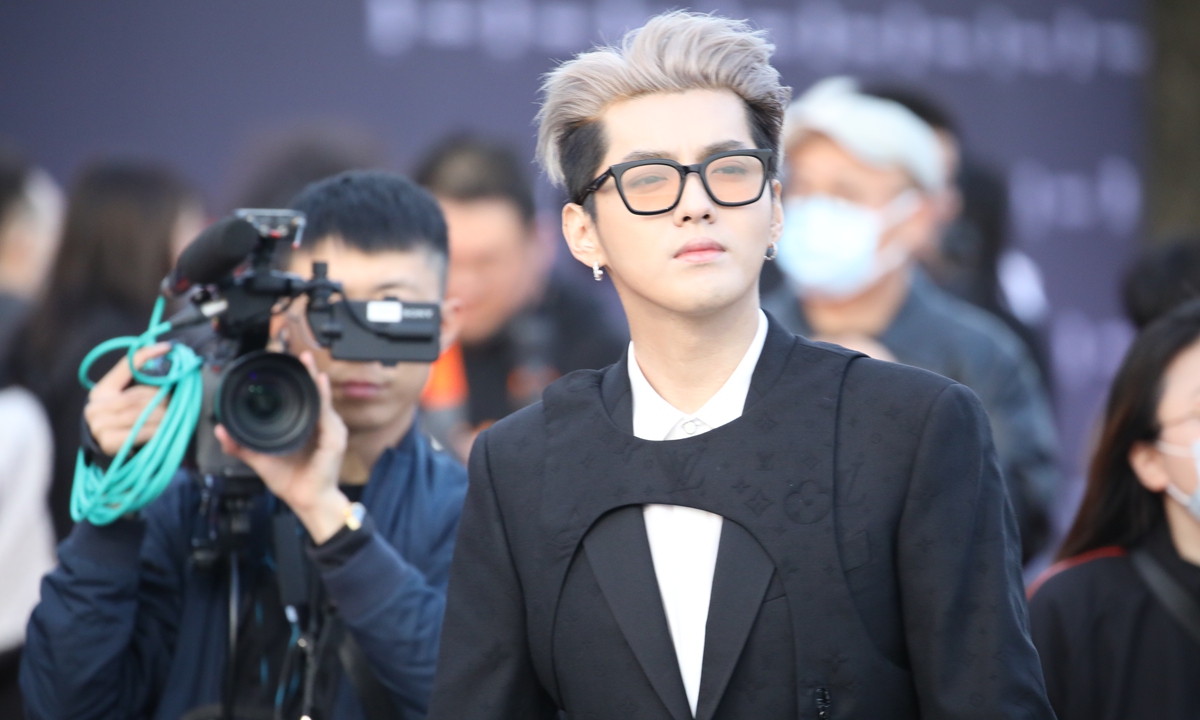
Kris Wu Photo: VCG
Some undesirable phenomena and problems in the entertainment industry have corrupted the industry's image and damaged the social atmosphere, Huang Kunming, head of the Publicity Department of the Communist Party of China Central Committee, said on Friday. Huang called for relevant organs to take resolute measures to address the problems.
Huang noted that rectification of key problems in the entertainment field must be strengthened with the guidance of core socialist values, and there should be coordinated governance based on the rule of law for the mechanisms of the industry.
Supervision of key parts should be strengthened and there should be increased accuracy and efficiency to ensure more orderly market behavior and a cleaner cyberspace, Huang said, adding that there should be improved education for industry practitioners. Also, more quality products are needed to satisfy the growing needs of the Chinese public.
Chinese authorities on Thursday enhanced management of entertainment programs and related personnel, calling for boycotts against individuals with records of illegal or immoral behaviors, as well as sky-high payments for stars and abnormal appreciation of niangpao, or feminine men.
Experts said the unprecedented forceful actions of the cyberspace, TV and culture authorities targeting the entertainment industry showed the country's firm determination to clean up chaos in the sector.
"The moves not only target chaos on the surface, but the gray industrial chain and capital behind the chaos. In other words, it is not only aimed at rectifying platforms, agencies or fanquan (fan circle), but radically reforming the industry," Shi Wenxue, a Beijing-based entertainment industry observer, told the Global Times on Thursday.
Individuals with a wrong political stance, and those who go against the country and the Communist Party of China, should not be employed by the industry. The same goes for those who violate Chinese laws or social morality, read a notice released by the Chinese National Radio and Television Administration on Thursday.
The administration also banned programs from raising idols or employing stars' children. Setting up lists to encourage fans to purchase items or pay member fees to support their idols, which exaggerates the fan circle chaos, is also prohibited.
According to a statement by the Publicity Department of the Communist Party of China Central Committee on Thursday, the department has launched a special campaign against problems and chaos in the entertainment industry.
It requires entertainment enterprises to resist sky-high salaries for film stars, rationally allocate the division of costs and severely investigate and punish tax evasion.
It also cracks down on the trend showed by internet media platforms in pursuing "clicks" and shut down several social media accounts seeking for illegal profits.
The statement also imposes tougher regulations on entertainment shows, banning minors from participating in reality shows and stars with notorious records from returning to such shows. It also makes special arrangements for further continuous rectification of disorders in fan circles.
Unlike programs featuring adult idols, competitors in idol-raising programs, or idol competitions, are usually underage trainees from entertainment companies.
The attraction of such programs is that fans can grow up with their idols and eventually vote to decide who can win the competition. Fans can feel the same psychological satisfaction and involvement as with raising children by engaging in these programs. Thus, it is the hardest-hit area of fanquan chaos, including problems of illegal fundraising and fierce online verbal quarrels, as fanatical fans will spare no effort to help the ones they love to succeed in the competition.
According to media reports on Wednesday, at least 28 mobile phone applications for star chasing have been registered in China, and they have obtained more than 640 million yuan ($99 million) of financing.
On August 25, Chinese video-streaming platform iQiyi announced that it would halt idol competition programs in the coming years amid the intensifying rectification campaign against the fanquan chaos.
Programs should promote the correct appreciation of beauty, and advocate excellent traditional and revolutionary culture. Abnormal aesthetic tastes for niangpao and programs to show off wealth or hype negative topics should be firmly boycotted, the administration said in the notice.
The administration also called for strict regulations on performers' and directors' payments' and serious penalties for those who violate regulations, conduct yin yang contracts, or equivocal contracts, or evade taxes.
Chinese authorities recently launched a campaign to clean up the entertainment industry and end the fanquan chaos, following some idols' acts that either seriously violated Chinese laws or harmed the Chinese people's national sentiment - for example, the tax evasion case of actress Zheng Shuang, the rape accusation against Chinese-Canadian rapper Kris Wu, and the visit of actor Zhang Zhehan to the Yasukuni Shrine in Japan.
The Thursday notice was the latest effort in the campaign to curb illicit behavior and unhealthy principles to "uphold online traffic" in the industry.
On the same day, the Ministry of Culture and Tourism issued a document, ordering live-streaming platforms and agencies to enhance management of livestreaming programs to prevent performers from inducing fans to buy virtual gifts, releasing false information to guide consumption, or playing up topics for publicity.
The China Association of Performing Arts on Thursday called for artists' agencies to embrace their responsibility to educate and guide performers, and it said that they should not indulge performers' illegal and immoral behavior. The agencies should also enhance their professional ethics and improve the supervision of brokers.
Some industry insiders and rational fans reached by the Global Times supported the effort to rectify the entertainment sector and end fanquan chaos, saying that they hope the industry could encourage those dedicated to producing good content rather than those who just want to make a fast buck by looking good.




